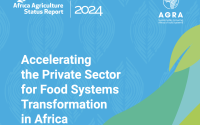AGRF 2023: Tanzania Sets a New Paradigm in Sustainable Agriculture and Food Security: A Model for Africa and Beyond
The recent announcement by Tanzania’s Minister of Livestock and Fisheries, Abdallah Ulega, represents a pivotal step toward what could be a paradigm shift in how countries approach food security, particularly in Africa. With a suite of multi-pronged strategies designed to boost food production and accelerate exports, Tanzania is positioning itself as a vanguard for change.
Emphasizing Sustainable Growth
Tanzania’s endeavors are encapsulated in its BBT LIFE (Building a Better Tomorrow—Livestock and Fisheries Entrepreneurs) project, an initiative that aims to harness the power of agriculture as a primary means for lifting the nation out of poverty. By training young farmers in modern and sustainable agricultural practices in various regions, the country is making an investment in its future, one that goes beyond mere fiscal terms. This brings into focus an invaluable and often ignored asset: human capital. The importance of engaging youth in these sectors cannot be overstated, as this age group is key to sustainable development.
Climate-Smart Agriculture
Ulega’s emphasis on climate change adaptation, particularly in the area of fodder crop cultivation for livestock, is an example of how sustainability can co-exist with profitability. Livestock has long been criticized for contributing to climate change through methane emissions. However, new techniques, such as improved grazing management and feed efficiency, can help mitigate these effects. The utilization of climate change adaptation funds to promote such activities signifies a nuanced understanding of the problems and the opportunities at hand.
Export Potential and Economic Upscaling
The Minister’s call for rapid development of ports and the acquisition of a 60-ton aircraft for fish exports offers a tantalizing peek into Tanzania’s ambitious plans to become a leading exporter. By boosting exports, Tanzania is not just looking to solve its domestic food security issue but is also making a significant contribution to global food security. With a dramatic increase in yield and sales forecasts, the country is scaling its efforts not just vertically but horizontally, covering multiple facets of the food production system.
Inclusive Dialogue and Learning
Hosting the upcoming Agricultural and Food Systems (AGRF) forum presents a dual opportunity for Tanzania. Firstly, it enables the sharing of knowledge and insights among participating countries, and secondly, it puts Tanzania in the limelight as a pioneering nation in sustainable food production strategies. The inclusion of livestock and fisheries into the agenda for the first time, traditionally underrepresented sectors, speaks volumes about the holistic and inclusive approach the country is taking.
A Crucial Pillar for Development
The statement by Vianey Rweyendela, the local manager of the African Agricultural Organization (Aggra), that “no country has escaped poverty without agriculture” rings especially true for Africa, a continent rich in arable land but plagued by systemic issues such as poverty and famine. Dr. James Rao’s input about the need for education on the role of livestock in nutrition and the economy further underscores the symbiotic relationship between agriculture and overall socioeconomic growth.
As Tanzania prepares for the AGRF conference, there is a palpable sense of optimism. The initiatives are a strong testament to what can be achieved when there is a fusion of political will, forward-thinking policies, and community engagement. While challenges certainly exist, the current trajectory suggests that Tanzania is setting a viable template for not just itself but potentially for all of Africa. This proactive approach to food security and agricultural development is a laudable step toward building not just a better tomorrow for Tanzania but a more food-secure and sustainable world for us all.a better tomorrow for Tanzania and


